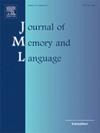Flexible utilization of spatial representation formats in working Memory: Evidence from both small-scale and large-scale environments
IF 3
1区 心理学
Q1 LINGUISTICS
引用次数: 0
Abstract
Extensive studies have examined spatial representations in working memory (WM). However, their format and consistency across laboratory and large-scale environments remain less understood. Drawing insights from perception research, we proposed two hypotheses regarding the formats: polar coordinates and Cartesian coordinates, and examined these hypotheses in both small-scale and large-scale environments by error correlation analysis. Participants memorized target locations and reproduced them on a computer screen or navigated to corresponding locations in a virtual reality environment. The results revealed that participants defaulted to using polar coordinates to represent space in both environments, rather than Cartesian coordinates. Moreover, the spatial representation format proved flexible. In laboratory settings with grid-like memory contexts, participants tended to adopt Cartesian representations, with the encoding phase playing a more crucial role than the response phase. In large-scale environments, an indirect response type prompted participants to adopt Cartesian representations. Overall, our study underscores the prevalence and flexibility of polar representations for space in WM.
工作记忆中空间表征格式的灵活运用:来自小尺度和大尺度环境的证据
对工作记忆(WM)中的空间表征进行了广泛的研究。然而,它们在实验室和大规模环境中的格式和一致性仍然知之甚少。根据感知研究的见解,我们提出了两种格式的假设:极坐标和笛卡尔坐标,并通过误差相关分析在小尺度和大尺度环境中检验了这些假设。参与者记住目标位置,并在计算机屏幕上再现它们,或者在虚拟现实环境中导航到相应的位置。结果显示,在这两种环境中,参与者都默认使用极坐标来表示空间,而不是笛卡尔坐标。此外,空间表示格式被证明是灵活的。在网格记忆情境的实验环境中,参与者倾向于采用笛卡尔表征,编码阶段比反应阶段发挥更重要的作用。在大规模环境中,间接反应类型促使参与者采用笛卡尔表征。总的来说,我们的研究强调了WM中空间极性表示的普遍性和灵活性。
本文章由计算机程序翻译,如有差异,请以英文原文为准。
求助全文
约1分钟内获得全文
求助全文
来源期刊
CiteScore
8.70
自引率
14.00%
发文量
49
审稿时长
12.7 weeks
期刊介绍:
Articles in the Journal of Memory and Language contribute to the formulation of scientific issues and theories in the areas of memory, language comprehension and production, and cognitive processes. Special emphasis is given to research articles that provide new theoretical insights based on a carefully laid empirical foundation. The journal generally favors articles that provide multiple experiments. In addition, significant theoretical papers without new experimental findings may be published.
The Journal of Memory and Language is a valuable tool for cognitive scientists, including psychologists, linguists, and others interested in memory and learning, language, reading, and speech.
Research Areas include:
• Topics that illuminate aspects of memory or language processing
• Linguistics
• Neuropsychology.

 求助内容:
求助内容: 应助结果提醒方式:
应助结果提醒方式:


